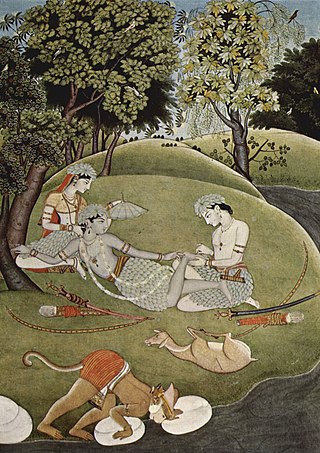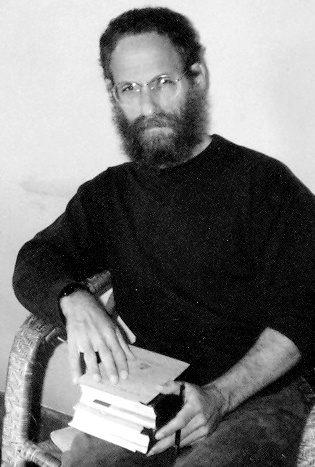
The Mahābhārata is one of the two major Sanskrit epics of ancient India in Hinduism, the other being the Rāmāyaṇa. It narrates the struggle between two groups of cousins in the Kurukshetra War and the fates of the Kaurava and the Pāṇḍava princes and their successors.

The Kama Sutra is an ancient Indian Sanskrit text on sexuality, eroticism and emotional fulfillment in life. Attributed to Vātsyāyana, the Kama Sutra is neither exclusively nor predominantly a sex manual on sex positions, but rather was written as a guide to the art of living well, the nature of love, finding a life partner, maintaining one's love life, and other aspects pertaining to pleasure-oriented faculties of human life. It is a sutra-genre text with terse aphoristic verses that have survived into the modern era with different bhāṣyas. The text is a mix of prose and anustubh-meter poetry verses. The text acknowledges the Hindu concept of Purusharthas, and lists desire, sexuality, and emotional fulfillment as one of the proper goals of life. Its chapters discuss methods for courtship, training in the arts to be socially engaging, finding a partner, flirting, maintaining power in a married life, when and how to commit adultery, sexual positions, and other topics. The majority of the book is about the philosophy and theory of love, what triggers desire, what sustains it, and how and when it is good or bad.

The Rāmāyana is a Sanskrit epic composed over a period of nearly a millennium, with scholars' estimates for the earliest stage of the text ranging from the 8th to 4th centuries BCE, and later stages extending up to the 3rd century CE. Ramayana is one of the two important epics of Hinduism, the other being the Mahābhārata.

Hanuman, also called Anjaneya, is a Hindu god and a divine vanara companion of the god Rama. Hanuman is one of the central characters of the Hindu epic Ramayana. He is an ardent devotee of Rama and one of the Chiranjivis. Hanuman is regarded to be the son of the wind-god Vayu, who in several stories played a direct role in Hanuman's birth, and considered to be an incarnation of Shiva in Shaivism. Hanuman is mentioned in several other texts, such as the epic Mahabharata and the various Puranas.
Gṛhastha literally means "being in and occupied with home, family" or "householder". It refers to the second phase of an individual's life in a four age-based stages of the Hindu asrama system. It follows celibacy life stage, and embodies a married life, with the duties of maintaining a home, raising a family, educating one's children, and leading a family-centred and a dharmic social life.
Indian epic poetry is the epic poetry written in the Indian subcontinent, traditionally called Kavya. The Ramayana and the Mahabharata, which were originally composed in Sanskrit and later translated into many other Indian languages, and the Five Great Epics of Tamil literature and Sangam literature are some of the oldest surviving epic poems ever written.

Kama means "desire, wish, longing" in Hindu, Buddhist, Jain, and Sikh literature. Kama often connotes sensual pleasure, sexual desire, and longing both in religious and secular Hindu and Buddhist literature, as well as contemporary Indian literature, but the concept more broadly refers to any desire, wish, passion, longing, pleasure of the senses, desire for, longing to and after, the aesthetic enjoyment of life, affection, or love, enjoyment of love is particularly with or without enjoyment of sexual, sensual and erotic desire, and may be without sexual connotations.
Artha is one of the four aims of human life in Indian philosophy. The word artha literally translates as "meaning, sense, goal, purpose or essence" depending on the context. Artha is also a broader concept in the scriptures of Hinduism, Buddhism and Jainism. As a concept, it has multiple meanings, all of which imply "means of life", activities and resources that enable one to be in a state one wants to be in.

Recent archaeological and other evidence suggests Hinduism has had some cultural, economic, political and religious influence in the Philippines. Among these is the 9th century Laguna Copperplate Inscription found in 1989, deciphered in 1992 to be Kawi script with Sanskrit words; the golden Agusan statue discovered in another part of Philippines in 1917 has also been linked to Hinduism.
Juan R. Francisco is a Filipino Indologist who discovered the Maranao version of the Ramayana, that is native to the Philippines. He then translated it into English. He is also a professor at the University of the Philippines in Manila. For several years he served as the Executive Director of the Philippine-American Educational Foundation (PAEF), administering the Fulbright Program in the Philippines.
Purushartha literally means "object(ive) of men". It is a key concept in Hinduism, and refers to the four proper goals or aims of a human life. The four puruṣārthas are Dharma, Artha, Kama and Moksha.
The following list consists of notable concepts that are derived from Hindu culture and associated cultures traditions, which are expressed as words in Sanskrit or other Indic languages and Dravidian languages. The main purpose of this list is to disambiguate multiple spellings, to make note of spellings no longer in use for these concepts, to define the concept in one or two lines, to make it easy for one to find and pin down specific concepts, and to provide a guide to unique concepts of Hinduism all in one place.

Bannanje Govindacharya was an Indian philosopher and Sanskrit scholar versed in Veda Bhashya, Upanishad Bhashya, Mahabharata, Puranas and Ramayana. He wrote Bhashyas (commentaries) on Veda Suktas, Upanishads, ShataRudriya, BrahmaSutra Bhashya, Gita Bhashya and was an orator. He was awarded the Padma Shri by the Government of India in 2009.

Sheldon I. Pollock is an American scholar of Sanskrit, the intellectual and literary history of India, and comparative intellectual history. He is the Arvind Raghunathan Professor of South Asian Studies at Columbia University. He was the general editor of the Clay Sanskrit Library and the founding editor of the Murty Classical Library of India.

Devdutt Pattanaik is a mythologist from Mumbai, India. He is also a speaker, illustrator and author, on Hindu sacred lore, legends, folklore, fables and parables. His work focuses largely on the areas of religion, mythology, and management. He has written books on the relevance of sacred stories, symbols and rituals in modern times; his more popular books include Myth = Mithya: A Handbook of Hindu MythologyJaya: An Illustrated Retelling of the Mahabharata and Sita: An Illustrated Retelling of the Ramayana and My Gita. Pattanaik has incorporated the Mahabharata and the Ramayana into human resource management.

Ervin Baktay was an author noted for popularizing Indian culture in Hungary.

The Mahabharata: A Shortened Modern Prose Version of the Indian Epic is a mythological book by R. K. Narayan. It is a modernised, shortened, and translated retelling of The Mahabharata. It was first published by Heinemann, London in 1978. The book was published as a result of a long endeavour that included three Hindu mythological works, Gods, Demons and Others, The Ramayana and finally The Mahabharata; in 1995, these works were republished as part of a new book, The Indian Epics Retold.
Filipinos living in India consists of migrants from the Philippines to India. As of March 2013, there are about 3,500 Filipinos living in the country. They form one of the largest expat minorities in India.
Kshemendra was an 11th-century Sanskrit polymath-poet, satirist, philosopher, historian, dramatist, translator and art-critic from Kashmir in India.










